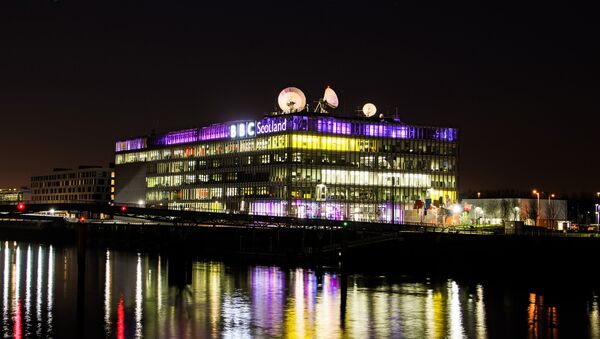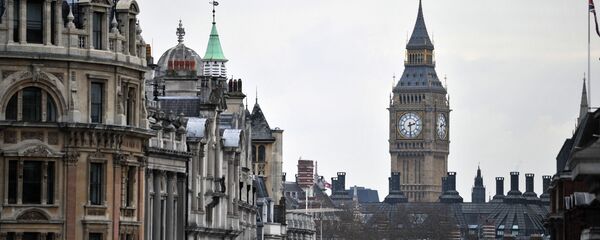"The BBC specifically is able to split the signal, so that when you have an election broadcast in one country, it can be a different party election broadcast shown in another part of the country. That allows there to be this nation-based allocation rather than a cross-pan UK approach," Tom Large, an official spokesman for the BBC told Sputnik.
Criteria published Wednesday by the BBC Trust, that oversees BBC policy, recommended that SNP party election broadcasts (PEBs) should not be shown in England, Wales and Northern Ireland, because the Party is not standing Westminster candidates there. The BBC Trust said that allowing SNP PEBs to be shown "would risk discrediting PEBs" and lead to "PEB fatigue" amongst viewers in the rest of the UK.
Linda Toft of the BBC Trust told Sputnik, "Any political party that meets the election criteria [set down by the BBC Trust] would be eligible for a party election broadcast. We're setting the criteria, not setting down what that means for the individual parties. The PEBs are done on a nation-by-nation basis. It really depends on what the individual parties choose to do this time round. This allocation criteria is consistent with what we have done in the past."
"Taking our message to viewers in Scotland is our top priority – and a strong team of SNP MPs [parliament members] will ensure Scotland's voice is heard at Westminster," SNP spokeswoman Lynne Currie told Sputnik.
But whilst Party Election Broadcasts by the SNP will not be shown by the main state broadcaster, the BBC, the other main public terrestrial channels in the UK, Channel 4 and Channel 5, will show the SNP PEBs across the whole of the UK.
Peter Heneghan, a spokesman for Channel 4 told Sputnik rules set down by the broadcasting regulator Ofcom obliged the non-BBC television channels to broadcast PEBs by the Scottish National Party and Welsh nationalists, Plaid Cymru.
"In terms of the Ofcom rules we are obliged to provide the SNP and Plaid Cymru election broadcasts," Heneghan told Sputnik. "Although allocations for Party Election broadcasts have not been made for the forthcoming General Election we expect that, as with the last General Election we will transmit broadcasts across our [UK] broadcast area for the SNP."
Heneghan added that similarly PEBs for the Labour Party, Liberal Democrats and Conservatives will also be shown in Northern Ireland despite those parties unlikely to stand candidates in the North of Ireland.
"Clearly the overall amount of news coverage of Labour and Conservatives on the BBC will massively exceed that of the SNP due to the former operating in both countries," Robertson told Sputnik.
"I think the variable representation on the leadership debates of the parties might favor the big two but, equally, both leaders are unattractive to considerable swathes of the electorate in Scotland," Robertson added.
"In particular, and they know it, the Conservatives would do better to minimize Cameron's exposure to debate with the populist UKIP and with the intelligent Greens. In Scotland the BBC giving time to [Labour Leader] Ed Miliband can only hurt Labour in Scotland," Robertson said.
There is considerable media and political speculation that the 2015 UK General Election maybe the most unpredictable in recent times.
The latest "poll of polls" produced by "What Scotland Thinks/ScotCen" suggests the SNP could win 52 seats at Westminster, with the Liberal Democrats, who filed candidates across the whole of the UK, down to just 28 parliamentarians.
Polling firm Populus also published data Friday showing the SNP had a "42 per cent chance of taking part in the next UK Government" in the event of a hung parliament leaving them to form a possible coalition with Labour or Conservatives.
The UK General Election will take place on May 7.





